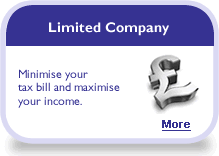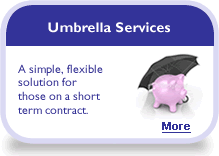What is a Sole trader?
This is the simplest way to run a business and is better known as being self-employed. It is low cost and popular with smaller businesses with lower turnovers and profit levels such as: plumbers, taxi drivers, builders etc. Legally, there is no difference between the owner's personal and business affairs, so this should be considered when thinking about taxation and legal liability issues. An important aspect is that the owner is taxed on all the profits, even if some are re-invested in the business. Accordingly sole trader status is not as tax efficient as trading through a Limited company as there are fewer opportunities for tax planning. This is why most businesses incorporate when business profit increases.
We can assist you with sole trader registration, VAT registration, record keeping and we can even assist with opening a business bank account
Contractors and freelance consultants should be aware that their clients or agency may not be prepared to engage them on a sole trader basis. This is because HM Revenue & Customs may challenge self-employed status and they may become liable for additional tax and NIC liabilities should HM Revenue & Customs succeed in reclassify you as an employee. The risk factor is greatest in the construction and contractor sectors as these areas are currently subject to particular focus by HM Revenue & Customs. Where an agency is involved you may not even be given the choice because The Income Tax (Earnings and Pensions) Act 2003 Section 44 effectively prevents individuals from trading as a sole trader through an agency, as it obliges the agency to treat the individual as if they were an employee, and requires the agency to deduct PAYE and NIC from any payments due.
What does being a sole trader involve? For more information…..
[link to What does being a sole trader involve internal page 2]Partnerships
Partnerships as a business model are very similar as a sole trader, except that they are used when more than one person wishes to own the business.
Each partner pays income tax, through the Self Assessment system, as well as Class 2 and Class 4 National Insurance - and the business itself pays VAT if it has registered. Each partners entitlement to profit i.e. profit share and also the assets of the business is determined by the partners and it is best practice to record this in a formal partnership agreement.
With Partnerships each partner has joint and several liability for the debts of the Partnership, so that if one partner cannot pay their share of any business debts, the debt will fall on the other partners.
Even the strongest relationships can suffer in difficult times and disagreements can arise overtime. Good planning is an essential part of creating a successful business partnership. It is important that partners plans for the unexpected and setting up a partnership agreement from the outset is essential.
Limited Liability Partnership - LLP
An LLP is a hybrid combining the characteristics of a traditional partnership with that of a Limited Company. As the name suggest an LLP provides the benefit of limited liability whilst allowing its members the flexibility of organising their internal structure as a traditional partnership.
An LLP is different from a traditional partnership and similar to a limited company in that it is a legal entity separate from its members. The partners are known as 'members' of the partnership which is formally incorporated to exist. LLP’s are required to file accounts with the Registrar of Companies and are subject to the Companies Act.
From a tax perspective members of an LLP are treated in the same way as self-employed partners and must register with the HMRC. Members of the LLP take remuneration in the form of drawings, which have no effect on the profits of the LLP declared for income tax purposes. ; in other words, drawings cannot be deducted from the profit figure to arrive at taxable profits. As with sole-traders and partners in a traditional partnership, members are not taxed on their drawings but on their profit share regardless of whether the profits are re-invested or otherwise retained in the business.















